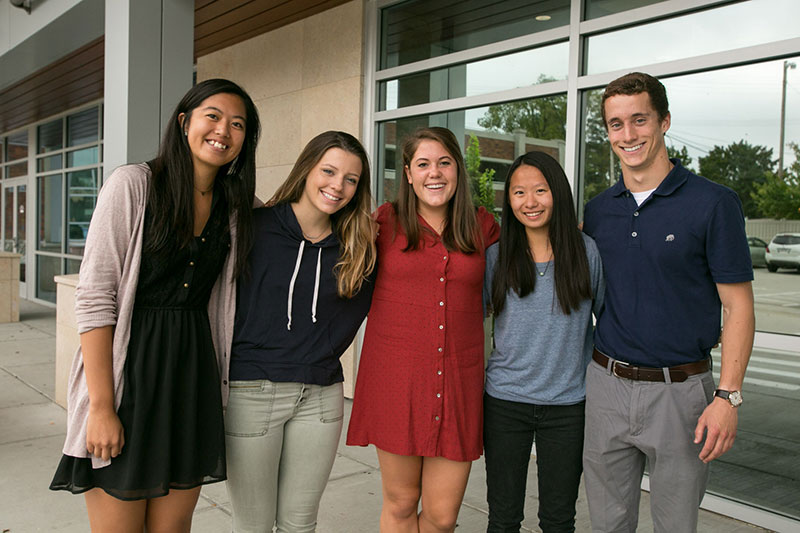“I worry that my food will run out before I get money to buy more.”
“My family needs clothing, diapers, car seats, back-to-school items, or other supplies.”
“I need help finding programs to help get a job or train for a job.”
At Access Community Health Centers Wingra Family Medical Center, screening statements like these are helping identify patients and families struggling with food security, employment, transportation, housing or child care—critical social needs that affect health.

Above, from left: student navigators Kara Chung, Johanna Balas, Jessie Miller, Allie Hung and Patrick O’Grady
Two-Thirds of Screened Patients Have Unmet Needs
The screening is part of a pilot collaboration between the UW-Madison Center for Patient Partnerships’ (CPP) Resource Navigator program and clinicians and staff at the Wingra clinic.
Every week, trained undergraduate student-navigators come to the clinic and screen the patients of Kirsten Rindfleisch, MD; Beth Potter, MD; and Ildi Martonffy, MD.
If a patient screens positive—that is, answers “Yes” to one or more of the social concerns listed on the screening tool—the navigators begin connecting the patient with appropriate community resources. They continue to follow up and refine plans until the patient’s needs are met.
The Resource Navigator program launched at the Wingra clinic at the end of March. In the first four months, navigators screened 395 patients, 263 (66%) of whom screened positive. As of July 15, navigators were still actively working with 151 (38%) patients.
Toward ‘Universal Screening’ of Social Needs
Dr. Rindfleisch explained that the navigators’ efforts build on individual interventions from the clinic’s social worker. “We’re trying to move toward universal screening of social needs, just like we screen for high blood pressure,” she said.
Plans are also underway to bring the navigators, the clinic social worker, nurse case managers and providers together for regular case conferences, so they can communicate as a group about patients’ needs.
The program doesn’t just benefit patients and families. Lane Hanson, MSW, who coordinates the Resource Navigator program for CPP, explained that it provides the undergraduate student-navigators, many of whom are pre-health sciences students, with valuable education on how social factors affect health in an underserved population.
“Students get to be part of team consults before medical school, which is great exposure for them,” she added. “They also learn to give feedback to providers about what’s happening with their patients.”
Dr. Rindfleisch would like to see the program serve as a foundation for a future community needs assessment. “We hope to use this data to create a picture of the holes in the safety net, and identify other resources that need to be developed in the community that can help meet our patients’ needs,” she said.
The Resource Navigator program was initially supported by the Wisconsin Partnership Program-funded initiative, Advocacy for Children — Transformational Impact Via Action and Teamwork for Engagement (ACTIVATE). Current support is provided by the David and Mary Anderson Family Foundation, with a challenge match for 2017-2019 (currently seeking matching funds from other sources).
Published: October 2016
